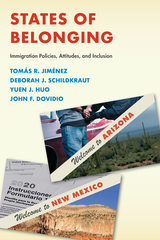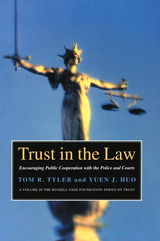2 books by Huo, Yuen J.

States of Belonging
Immigration Policies, Attitudes, and Inclusion
Tomas R. Jimenez
Russell Sage Foundation, 2021
Political turmoil surrounding immigration at the federal level and the inability of Congress to pass comprehensive immigration reform have provided an opening for state and local governments to become more active in setting their own immigration-related policies. States largely dictate the resources, institutions, and opportunities immigrants can access: who can get a driver’s license or attend a state university, what languages are spoken in schools and public offices, how law enforcement interacts with the public, and even what schools teach students about history. In States of Belonging, an interdisciplinary team of immigration experts – Tomás R. Jiménez, Deborah J. Schildkraut, Yuen J. Huo, and John F. Dovidio – explore the interconnections among immigration policies, attitudes about immigrants and immigration, and sense of belonging in two neighboring states – Arizona and New Mexico – with divergent approaches to welcoming newcomers.
Arizona and New Mexico are historically and demographically similar, but they differ in their immigration policies. Arizona has enacted unwelcoming policies towards immigrants, restricting the access of immigrants to state resources, social services, and public institutions. New Mexico is more welcoming, actively seeking to protect the rights of immigrants and extending access to state resources and institutions. The authors draw on an original survey and in-depth interviews of a cross-section of each state’s population to illustrate how these differing approaches affect the sense of belonging not only among immigrants, but among the U.S.-born as well.
Respondents in Arizona, regardless of whether they were foreign- or native-born or their ethno-racial background, agreed that the state is unwelcoming to immigrants, and they pointed to Arizona’s restrictive policies as the primary factor. The sense of rejection perceived by Latinos in Arizona, including the foreign-born and the U.S.-born, was profound. They felt the effects of administrative and symbolic exclusions of the state’s unwelcoming policies as they went about their daily lives.
New Mexico’s more welcoming approach had positive effects on the Latino immigrant population, and these policies contributed to an increased sense of belonging among U.S.-born Latinos and U.S.-born whites as well. The authors show that exposure to information about welcoming policies is associated with an improved sense of belonging across most population groups. They also find that the primary dividing line when it came to reactions to welcoming policies was political, not ethno-racial. Only self-identified Republicans, Latino as well as white, showed reduced feelings of belonging.
States of Belonging demonstrates that welcoming policies cultivate a greater sense of belonging for immigrants and other state citizens, suggesting that policies aimed at helping immigrants gain a social, economic, and political foothold in this country can pay a broad societal dividend.
Arizona and New Mexico are historically and demographically similar, but they differ in their immigration policies. Arizona has enacted unwelcoming policies towards immigrants, restricting the access of immigrants to state resources, social services, and public institutions. New Mexico is more welcoming, actively seeking to protect the rights of immigrants and extending access to state resources and institutions. The authors draw on an original survey and in-depth interviews of a cross-section of each state’s population to illustrate how these differing approaches affect the sense of belonging not only among immigrants, but among the U.S.-born as well.
Respondents in Arizona, regardless of whether they were foreign- or native-born or their ethno-racial background, agreed that the state is unwelcoming to immigrants, and they pointed to Arizona’s restrictive policies as the primary factor. The sense of rejection perceived by Latinos in Arizona, including the foreign-born and the U.S.-born, was profound. They felt the effects of administrative and symbolic exclusions of the state’s unwelcoming policies as they went about their daily lives.
New Mexico’s more welcoming approach had positive effects on the Latino immigrant population, and these policies contributed to an increased sense of belonging among U.S.-born Latinos and U.S.-born whites as well. The authors show that exposure to information about welcoming policies is associated with an improved sense of belonging across most population groups. They also find that the primary dividing line when it came to reactions to welcoming policies was political, not ethno-racial. Only self-identified Republicans, Latino as well as white, showed reduced feelings of belonging.
States of Belonging demonstrates that welcoming policies cultivate a greater sense of belonging for immigrants and other state citizens, suggesting that policies aimed at helping immigrants gain a social, economic, and political foothold in this country can pay a broad societal dividend.
[more]

Trust in the Law
Encouraging Public Cooperation with the Police and Courts
Tom R. Tyler
Russell Sage Foundation, 2002
Public opinion polls suggest that American's trust in the police and courts is declining. The same polls also reveal a disturbing racial divide, with minorities expressing greater levels of distrust than whites. Practices such as racial profiling, zero-tolerance and three-strikes laws, the use of excessive force, and harsh punishments for minor drug crimes all contribute to perceptions of injustice. In Trust in the Law, psychologists Tom R. Tyler and Yuen J. Huo present a compelling argument that effective law enforcement requires the active engagement and participation of the communities it serves, and argue for a cooperative approach to law enforcement that appeals to people's sense of fair play, even if the outcomes are not always those with which they agree. Based on a wide-ranging survey of citizens who had recent contact with the police or courts in Oakland and Los Angeles, Trust in the Law examines the sources of people's favorable and unfavorable reactions to their encounters with legal authorities. Tyler and Huo address the issue from a variety of angles: the psychology of decision acceptance, the importance of individual personal experiences, and the role of ethnic group identification. They find that people react primarily to whether or not they are treated with dignity and respect, and the degree to which they feel they have been treated fairly helps to shape their acceptance of the legal process. Their findings show significantly less willingness on the part of minority group members who feel they have been treated unfairly to trust the motives to subsequent legal decisions of law enforcement authorities. Since most people in the study generalize from their personal experiences with individual police officers and judges, Tyler and Huo suggest that gaining maximum cooperation and consent of the public depends upon fair and transparent decision-making and treatment on the part of law enforcement officers. Tyler and Huo conclude that the best way to encourage compliance with the law is for legal authorities to implement programs that foster a sense of personal involvement and responsibility. For example, community policing programs, in which the local population is actively engaged in monitoring its own neighborhood, have been shown to be an effective tool in improving police-community relationships. Cooperation between legal authorities and community members is a much discussed but often elusive goal. Trust in the Law shows that legal authorities can behave in ways that encourage the voluntary acceptance of their directives, while also building trust and confidence in the overall legitimacy of the police and courts. A Volume in the Russell Sage Foundation Series on Trust
[more]
READERS
Browse our collection.
PUBLISHERS
See BiblioVault's publisher services.
STUDENT SERVICES
Files for college accessibility offices.
UChicago Accessibility Resources
home | accessibility | search | about | contact us
BiblioVault ® 2001 - 2024
The University of Chicago Press









